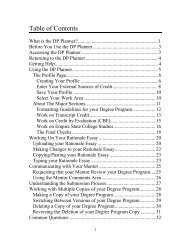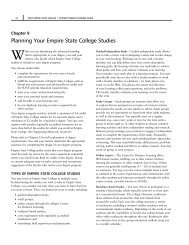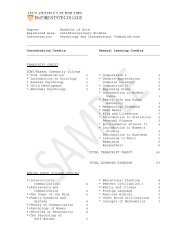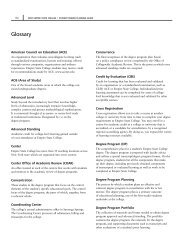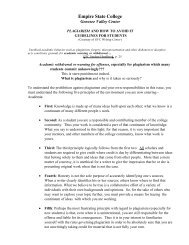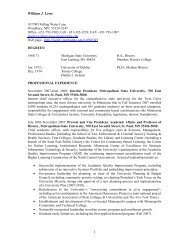All About Mentoring Spring 2011 - SUNY Empire State College
All About Mentoring Spring 2011 - SUNY Empire State College
All About Mentoring Spring 2011 - SUNY Empire State College
You also want an ePaper? Increase the reach of your titles
YUMPU automatically turns print PDFs into web optimized ePapers that Google loves.
53<br />
Education and Individualism:<br />
Some Notes, Some Questions<br />
Carla R. Payne, Professor Emerita of Graduate Studies, Union Institute and University, and<br />
Adjunct Faculty, Community <strong>College</strong> of Vermont<br />
1. I have the privilege of teaching philosophy,<br />
which gives me a glimpse into what students<br />
are thinking. Over the years, I have noticed<br />
that the ethical relativism that is endemic<br />
among undergraduates is beginning to<br />
have an analogy in their attitude toward<br />
ontology. Not only do many of my students<br />
insist that what is good and right is relative<br />
to the individual, but also that what is real is<br />
real only in relation to the individual person.<br />
This goes beyond even Jamesian pluralism<br />
to what amounts to an insistence on the<br />
democracy of existence itself. Whatever the<br />
logical merits of such a position, it does not<br />
seem to result from reflection on the nature<br />
of things, but rather from a sense that any<br />
other position would not be fair, i.e., that<br />
a monolithic reality would infringe on<br />
individual rights. This may be the ultimate<br />
ought-is argument: x should not be the<br />
case, and therefore x is not the case. But I<br />
am concerned here less with the soundness<br />
of this train of thought than with the way<br />
it mirrors the assumptions in our present<br />
political environment.<br />
2. Some examples to consider:<br />
• Headline: Rift in Arizona as Latino<br />
Class is Found Illegal. A high school<br />
class in Latino literature is found to be<br />
in violation of Arizona legislation (HB<br />
2281, May 10, 2010), which stipulates<br />
that “A school district or charter school in<br />
this state shall not include in its program<br />
of instruction any courses or classes that<br />
include any of the following: … Advocate<br />
ethnic solidarity instead of the treatment<br />
of pupils as individuals” (Lacey, <strong>2011</strong>).<br />
• After the shootings in Tucson, Sarah<br />
Palin is quoted as saying that “. . . acts<br />
like the shootings in Arizona ‘begin and<br />
end with the criminals who commit<br />
them, not collectively with all the citizens<br />
of a state.’” “Ms. Palin quoted former<br />
President Ronald Reagan as saying that<br />
society should not be blamed for the acts<br />
of an individual. She said, ‘It is time to<br />
restore the American precept that each<br />
individual is accountable for his actions’”<br />
(Shear, <strong>2011</strong>).<br />
The political implications and motivations<br />
of the Arizona legislation and of<br />
pronouncements similar to Palin’s have been<br />
widely canvassed, but the extent to which<br />
they reflect a major theme in American<br />
culture, rooted perhaps even more deeply<br />
than chauvinism, is not being given equal<br />
attention. Individualism is the mantra, and<br />
the virtues of individualism are proclaimed<br />
and assumed, but rarely examined for their<br />
implications. Are we, after all, biological<br />
atoms, each thrown into the world to<br />
compete with every other, owing nothing<br />
of ourselves to any others and therefore<br />
without essential ties beyond ourselves<br />
Aristotle asserted that we can’t even be<br />
human outside human society, and there<br />
are centuries of research demonstrating the<br />
importance of the social environment on our<br />
physical, physiological and psychological<br />
development. But radical individualism<br />
occurs and recurs as a leading motif, and<br />
indeed as an article of faith, throughout<br />
American history. Our most recent versions<br />
of libertarianism trumpet it: because any<br />
government that is democratic is necessarily<br />
a collective enterprise of the governed, even<br />
such a government must infringe on the<br />
absolute autonomy of the individual person.<br />
The contemporary insistence on the virtues<br />
of choice and on the total responsibility<br />
of each person for his/her own fate, which<br />
we see shaping policy from health care to<br />
financial regulation, is another variation on<br />
this same theme.<br />
3. An educational system is bound to reflect<br />
the underlying assumptions of the society<br />
that it serves. But we must recognize that<br />
to the extent that education is implemented<br />
through social organization, there is a fatal<br />
inconsistency in insisting that certain values<br />
can be inculcated and at the same time<br />
that what we experience doesn’t count in<br />
making us who we are. Does it make sense<br />
to argue that family values (or any values)<br />
need to be cherished and perpetuated, and<br />
simultaneously that we are all radically and<br />
solely responsible for who we are and what<br />
we do Or does this argument apply only<br />
to criminals, while those of us who turn<br />
out to be “good citizens” owe our virtue<br />
to parental teaching, proper schooling,<br />
religious indoctrination or divine grace<br />
4. It is interesting to realize that in 1930,<br />
at the beginning of the Great Depression,<br />
John Dewey drew a distinction between<br />
an older individualism and a newer one,<br />
regarding individualism as a “mental and<br />
moral structure,” itself dynamic, evolving<br />
and changing “with every great change in<br />
social constitution” (Dewey, 1962). The<br />
older individualism he saw as rooted in<br />
feudalism, and as later transformed by<br />
the industrial revolution. It was defined<br />
by economic self-interest, at a time when<br />
such an understanding of individualism<br />
represented resistance to prevailing legal<br />
and political repression. But “emergent<br />
individualism,” according to Dewey,<br />
consonant with the forces of the present<br />
time, is impeded by our “opposing the<br />
socially corporate to the individual” (1962).<br />
Of course the terms of that opposition are<br />
now themselves transformed by the passage<br />
from the machine-dominated industry of<br />
his era to the digital technology of ours, but<br />
Dewey’s rejection of personal or individual<br />
gain as the sole and permanent driver of<br />
progress is still highly relevant, as is his<br />
repudiation of the idea that the ties that<br />
bind us together in community “are merely<br />
external, and do not react into mentality<br />
and character, producing the framework<br />
of personal disposition” (Dewey, 1962).<br />
It is the contradiction of this very insight<br />
suny empire state college • all about mentoring • issue 39 • spring <strong>2011</strong>



